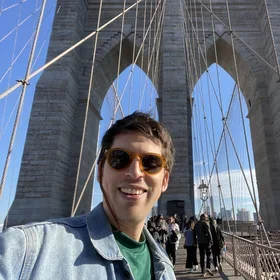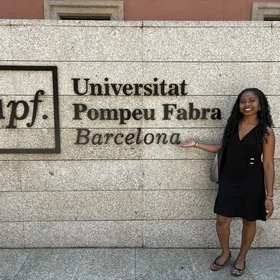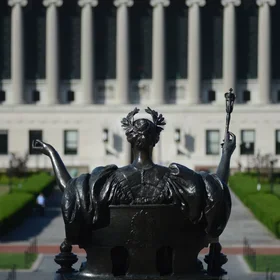Yilin Liu was majoring in accounting at Wake Forest University when a freshman seminar awakened an interest in history that led her all the way back to ancient Greece. Now, Yilin is a student in the Advanced Graduate Certificate in Classics at the School of Professional Studies, where she is preparing to apply to graduate programs. She was recently awarded an SPS fellowship, a $900 grant for a research project that combines ancient Greek epigraphy with data visualization.
She took time from her research to talk about her love for Greek literature and her hopes to make ancient source materials more digitally accessible.
What were you doing before you came to the program at Columbia?
I graduated in 2018 from Wake Forest, where I majored in history and minored in art history and classical studies. I started to study classics very late compared to people who started studying Latin in middle school. I came to the States from China when I was 18 years old, so I didn’t begin to study Greek until my junior year and Latin until my senior year. I began browsing postbaccalaureate programs online, applied to UPenn, UCLA, and Columbia, and was accepted by all of them.
Actually, I previously had this prejudice about Columbia—that it’s in a city and just too noisy. But it was recommended by my mentor in undergrad, and Columbia definitely has one of the best faculties in the classics field. When I visited, one of the Ph.D. candidates, who’s still a friend, took me around, and his enthusiasm really attracted me here.
My primary goal for the program was the language courses, Greek and Latin. I started with the intensive elementary Greek course because the classes I took in undergrad were less syntactically focused.
— Yilin Liu, '20SPS, Advanced Graduate Certificate in Classics
What drew you to the study of classics?
That’s an interesting question! I was an accounting major before. I took a history seminar in my freshman year, and there was discussion of the Tiananmen Square protest, which I had no knowledge of before. Both of my parents had full knowledge of it, but we just never talked about it. It just blew my mind and made me realize how little I knew about history.
I began to think about the cultural differences between the West and the East—if we can say that. I read the book Why the West Rules—for Now and began thinking about why our daily life is saturated with Western ideology. I also took a course about the British after 1800. And I found that I would have to go further back to more ancient history courses. I just became fascinated by Greek civilization and the literature itself. You can always learn something from Greek literature. Learning classics is like a life course: sometimes you can’t understand some of the passages without aging.
What courses have you been taking for the postbaccalaureate program?
My primary goal for the program was the language courses, Greek and Latin. I started with the intensive elementary Greek course because the classes I took in undergrad were less syntactically focused. I took a required postbacc seminar in the first year and also history classes, which I’m currently interested in. And I’m taking a combined class in theater and classics called “Ancient Greek Tragedy on the Modern Stage.” We read ancient Greek plays written by Sophocles and Aeschylus, as well as modern adaptations, and then we do a small group performance.
Tell us about your research project.
My project involves digitization of the Athenian Tribute List, which is an epigraphical work from the time of the Peloponnesian War that shows how the Athenians recorded the annual tribute payments they received from islands, from Asia Minor, and other communities. I am trying to map out the entries on this huge, stone epigraphical work into a visualization of the tribute system for Athens that shows how different communities paid different amounts. The first step of the project is to map everything by JavaScript, and then I’ll write about the rationale and significance behind it.
Scholars have done a lot of work on restoration or talking about historical significance of this work, but we hardly have investigated the significance beyond the numbers. For example, you’ll see that a very prosperous island had already been paying a lot, and then there is a reassessment in one year that demanded they pay more than any other island. Why is that? My job is to understand why.
I also want to show that we can do a lot more digitally with our sources. We often have to rely on big books you can only access in a certain room in the library. There are other sources I can use online—Google has been doing research in using deep learning to read epigraphy—but digital classics still has a long way to go, and I think we can still do more.
I feel very honored to receive the fellowship, and I have a lot of appreciation for this program. I hope that I can make an impact—not only with the project I’m working on right now but also the work that I present in the future.
— Yilin Liu, '20SPS, Advanced Graduate Certificate in Classics
What do you hope to do in the future?
I plan to apply to masters and doctoral programs to be a classicist. The University of Michigan is very good because they have one of the top digital programs, and also the faculty is brilliant. UC Berkeley is also one of my top choices. I think the fellowship will help. I feel very honored to receive it, and I have a lot of appreciation for this program.
I hope that I can make an impact—not only with the project I’m working on right now but also the work that I present in the future. And I just love reading Greek! It always gives me inspiration, and I just hope I can do this my whole life.
Learn more about the Classics Certificate program.


